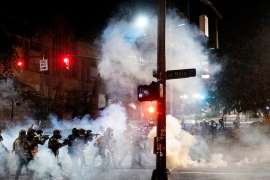By Byron Tau. Wall Street Journal–
The presence of federal agents from the Department of Homeland Security in Portland, Ore., has generated complaints from citizens, local officials and even other federal law-enforcement personnel—raising questions about the legality of the deployment.
Those personnel have been deployed to Portland in response to weeks of nationwide unrest after the killing of George Floyd, a Black man, at the hands of police in Minneapolis. Federal agents were also sent to Washington, D.C., and Seattle.
Acting Homeland Security Secretary Chad Wolf, who visited Portland last week, said DHS personnel were in the city because “violent anarchists” had damaged federal buildings and injured federal personnel.
“We’re going to have more federal law enforcement—that, I can tell you,” Mr. Trump said, speaking to reporters in the Oval Office. “In Portland, they’ve done a fantastic job.”
Local and state leaders have called on the Trump administration to withdraw federal personnel from the city’s streets, saying their presence is increasing tensions.
Oregon Attorney General Ellen Rosenblum on Friday sued federal agencies, alleging they had violated Oregonians’ civil rights. It is unclear how quickly the suit will be resolved. On Monday, Oregon Sens. Ron Wyden and Jeff Merkley, both Democrats, introduced legislation in Washington to stop the Trump administration from deploying federal forces in the city. Lawmakers have also called for an independent investigation into “the unrequested presence and violent actions.”
“This gross violation of Americans’ civil rights must end immediately,” Mr. Merkley said.
Can the federal government deploy law enforcement into a city or state against the wishes of local leaders?
In general, yes. Federal agents have the authority to protect federal interests, federal property and enforce federal law in states even over the objection of local or state leaders. In addition, many states have passed laws giving federal agents the authority to enforce state law within their borders in some circumstances, though they could in theory revoke that authority,
Most of the time, federal authorities tend to leave public safety issues to state and local governments as part of the separation of powers that gives certain responsibilities to the states and others to the federal government.
“This is just basically 10th Amendment 101,” said Juliette Kayyem, a former assistant secretary at DHS during the Obama administration, referring to the part of the U.S. Constitution that delineates federal and state powers. “Generally the powers of public safety lie in states and local government.”
The Trump administration has said the presence of federal agents in Portland is needed to protect federal courthouses and other buildings in the city from graffiti and vandalism—a mission in which federal agents aren’t generally used.
“Even assuming there was some risk or some threat, not every threat is a federal mission,” said Ms. Kayyem.
Can agents from the Department of Homeland Security be used for law enforcement?
Any federal agent can be used as part of a mission to defend federal property, but law-enforcement authorities, powers and missions differ among federal agencies.
The nation’s premier law-enforcement agency is the Federal Bureau of Investigation, overseen by the Justice Department and with a broad mandate to investigate violations of federal law. DHS has several law-enforcement entities, including Customs and Border Protection and Immigration and Customs Enforcement, that have unique border authorities.
Other agencies like the U.S. Marshals, Secret Service, Drug Enforcement Administration and Bureau of Alcohol, Tobacco, Firearms and Explosives have more specialized missions.
What authority does the federal government have to detain protesters?
In a number of cases, Portland protesters have complained about being forced into an unmarked vehicle by federal agents, brought to a new location for questioning and then released without charges.
Like police officers, federal agents generally need probable cause—usually defined as a reasonable basis to believe that a crime has been committed—to make an arrest.
Police may briefly detain individuals to question them about potential crime, though such questioning is voluntary and Americans have the right to invoke the Fifth Amendment and decline to answer questions from law enforcement.
In the U.S., most federal agents and police departments don’t have what is called investigative detention authority—the ability to take someone into custody to question them. However, several DHS components do have such authority based on their mission of protecting the border.
It is unknown if DHS is relying on its border authority to conduct detentions in Portland. Critics say such use of the agency’s special authorities would be inappropriate.
“If federal agents are legitimately protecting federal property and federal officials, then I think it’s appropriate for federal law enforcement to be there,” said Chuck Rosenberg, a former federal prosecutor who has also served in senior roles at the FBI and DEA. “But if you’re simply trying to use border authority—and you’re defaulting to DHS because they’re the ones that carry that sort of authority—that strikes me as problematic”
Many of the complaints about law-enforcement activity in Portland derive from the tactics used by police officers—such as the use of unmarked vehicles or the fact that law enforcement aren’t wearing nametags. There is no requirement in federal law that agents wear nametags or drive marked vehicles.
“Federal agents don’t typically use marked vehicles and they don’t typically wear their names on their clothing. So it may technically be lawful. That doesn’t make it a good idea,” said Mr. Rosenberg.
Write to Byron Tau at byron.tau@wsj.com


Leave A Comment
You must be logged in to post a comment.